Module 4 Rules and suggestions Unit 3 Language in use.语法课件(共26张PPT)
文档属性
| 名称 | Module 4 Rules and suggestions Unit 3 Language in use.语法课件(共26张PPT) | 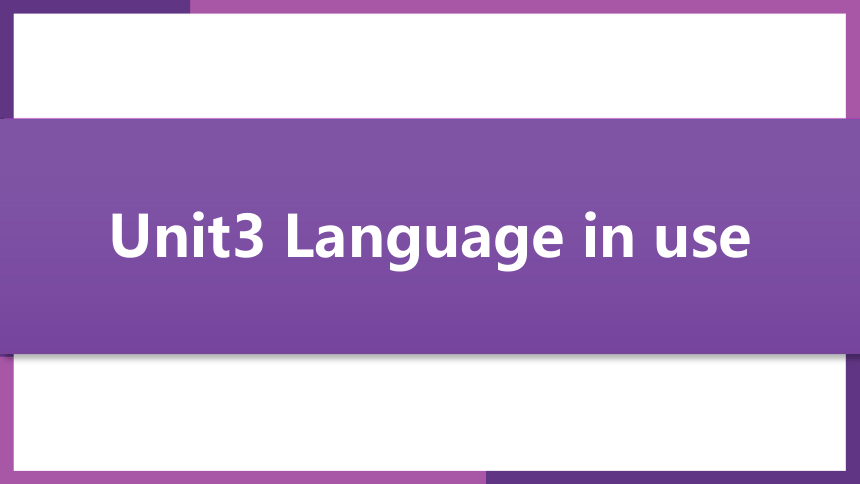 | |
| 格式 | zip | ||
| 文件大小 | 587.0KB | ||
| 资源类型 | 教案 | ||
| 版本资源 | 外研版 | ||
| 科目 | 英语 | ||
| 更新时间 | 2022-06-05 06:23:19 | ||
图片预览

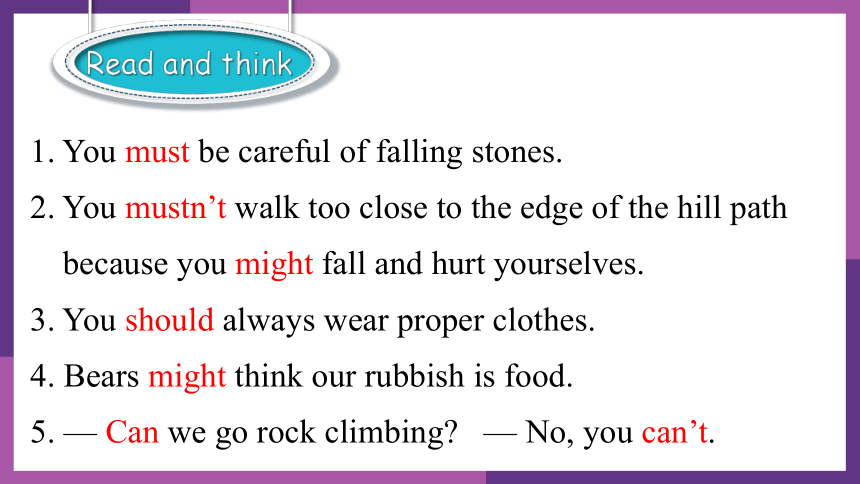
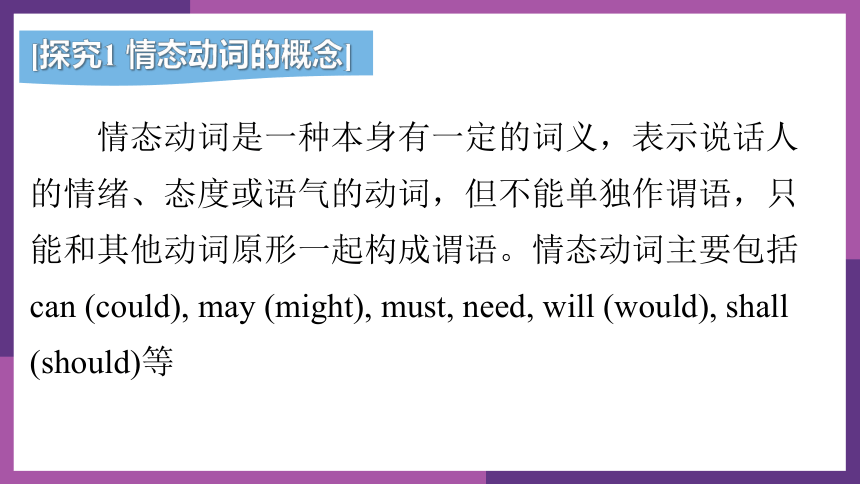
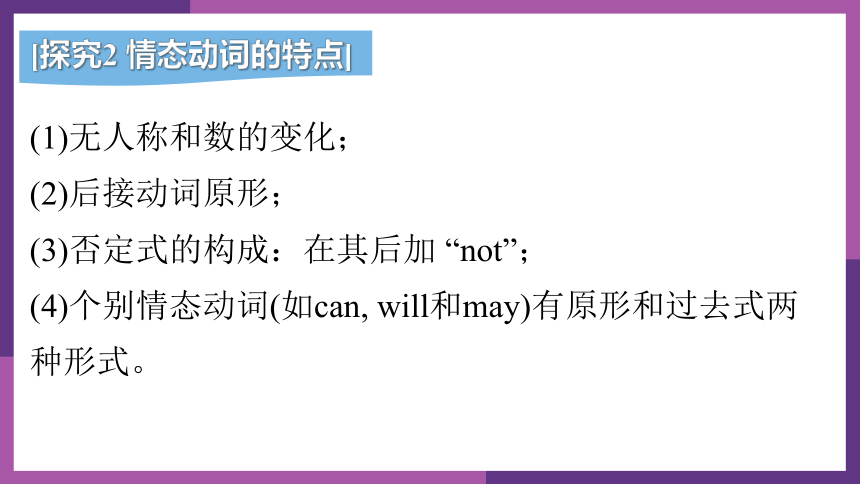
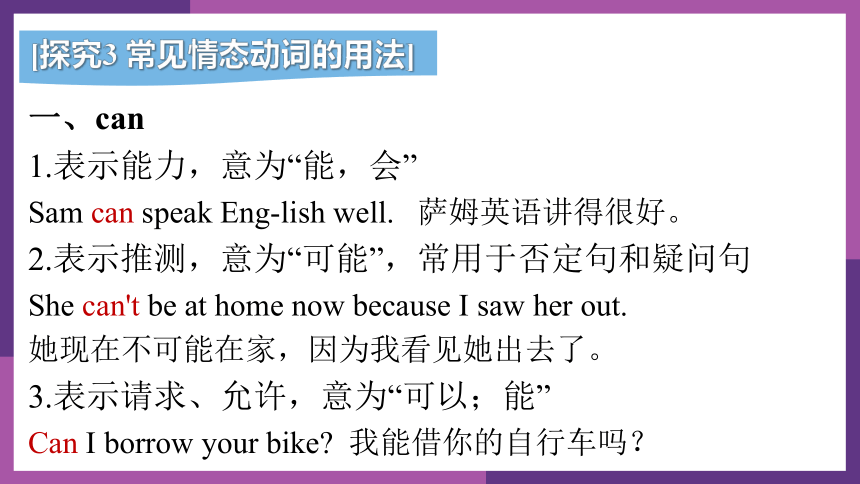
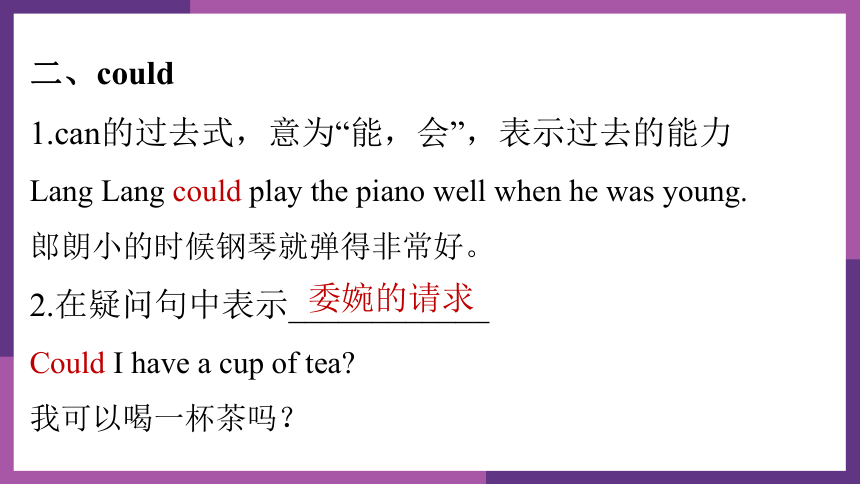
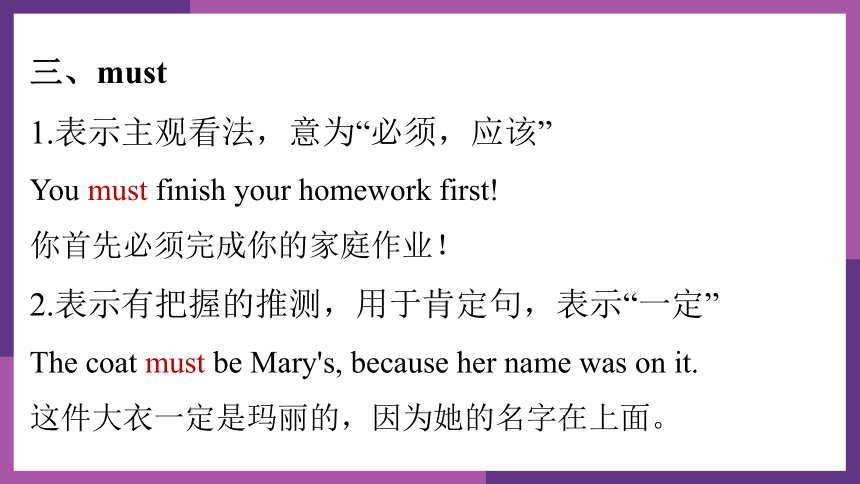
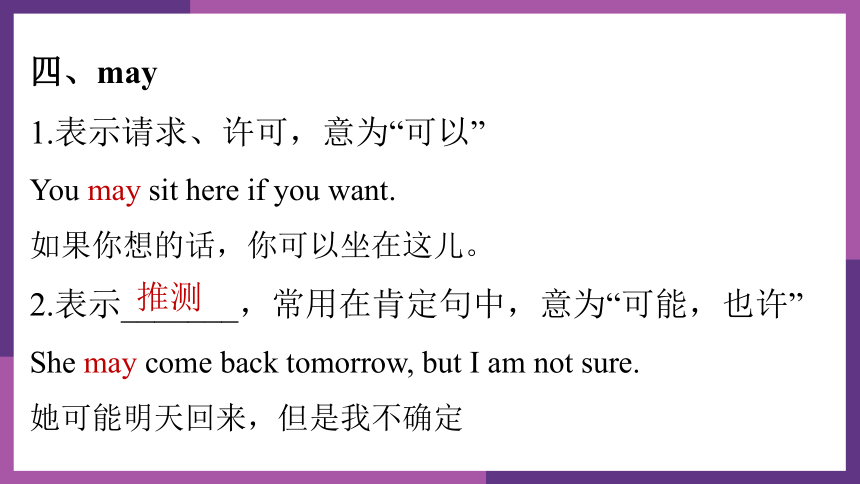
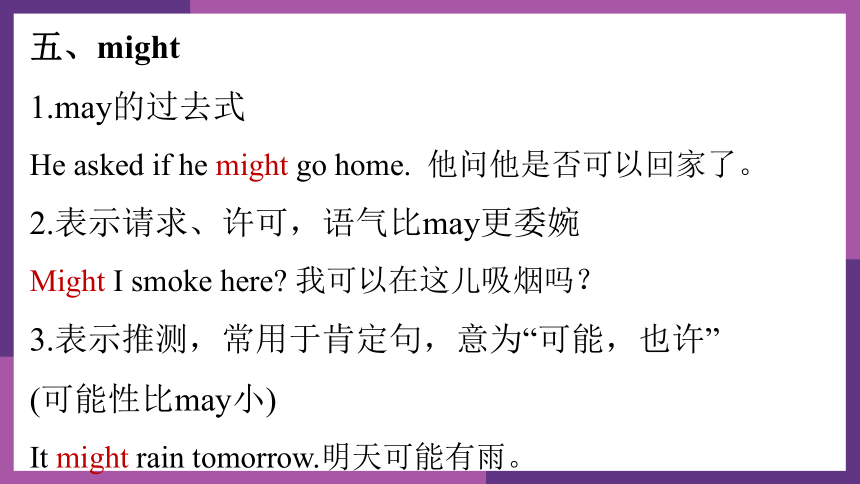
文档简介
(共26张PPT)
Unit3 Language in use
1. You must be careful of falling stones.
2. You mustn’t walk too close to the edge of the hill path because you might fall and hurt yourselves.
3. You should always wear proper clothes.
4. Bears might think our rubbish is food.
5. — Can we go rock climbing — No, you can’t.
Read and think
[探究1 情态动词的概念]
情态动词是一种本身有一定的词义,表示说话人的情绪、态度或语气的动词,但不能单独作谓语,只能和其他动词原形一起构成谓语。情态动词主要包括can (could), may (might), must, need, will (would), shall (should)等
[探究2 情态动词的特点]
(1)无人称和数的变化;
(2)后接动词原形;
(3)否定式的构成:在其后加 “not”;
(4)个别情态动词(如can, will和may)有原形和过去式两种形式。
[探究3 常见情态动词的用法]
一、can
1.表示能力,意为“能,会”
Sam can speak Eng lish well. 萨姆英语讲得很好。
2.表示推测,意为“可能”,常用于否定句和疑问句
She can't be at home now because I saw her out.
她现在不可能在家,因为我看见她出去了。
3.表示请求、允许,意为“可以;能”
Can I borrow your bike 我能借你的自行车吗?
二、could
1.can的过去式,意为“能,会”,表示过去的能力
Lang Lang could play the piano well when he was young.
郎朗小的时候钢琴就弹得非常好。
2.在疑问句中表示____________
Could I have a cup of tea
我可以喝一杯茶吗?
委婉的请求
三、must
1.表示主观看法,意为“必须,应该”
You must finish your homework first!
你首先必须完成你的家庭作业!
2.表示有把握的推测,用于肯定句,表示“一定”
The coat must be Mary's, because her name was on it.
这件大衣一定是玛丽的,因为她的名字在上面。
四、may
1.表示请求、许可,意为“可以”
You may sit here if you want.
如果你想的话,你可以坐在这儿。
2.表示_______,常用在肯定句中,意为“可能,也许” She may come back tomorrow, but I am not sure.
她可能明天回来,但是我不确定
推测
五、might
1.may的过去式
He asked if he might go home. 他问他是否可以回家了。
2.表示请求、许可,语气比may更委婉
Might I smoke here 我可以在这儿吸烟吗?
3.表示推测,常用于肯定句,意为“可能,也许”
(可能性比may小)
It might rain tomorrow.明天可能有雨。
六、need
表示“需要,有必要”,主要用在否定句和疑问句中
You needn't say sorry to him. 你没必要对他说对不起。
七、shall
表示征求意见,主要用于第一人称作主语的问句
—Shall we go fishing now 我们现在一起去钓鱼好吗?
—Yes, let's go. 好,咱们去吧。
八、should
意为“应该”,表示建议或劝告,可用于各种人称和句式。
You should eat healthy food. 你应该吃健康食物。
九、will
用于第二人称,表示询问、请求,也可表达现在的意愿
Will you pass me the book 把那本书递给我好吗?
十、would
用于表示过去的意愿或委婉询问
He asked if I would show him the way.
他问我是否愿意给他带路。
[注意]
1.由must引导的一般疑问句,肯定回答用must,否定回答用needn't或don't have to。如:
—Must I stay here?我必须待在这儿吗?
—Yes, you must./No, you needn't.是的,必须。/不,不必。
2.need作实义动词时,有人称和数的变化,后面可接名词、代词、动名词及动词不定式;可用在肯定句、疑问句和否定句中。
1
Match the signs with the rules and warnings.
a
b
c
e
d
f
1. No smoking.
2. No eating or drinking.
3. Children crossing.
4. Danger! Be careful of falling rocks.
5. Children should be taken care of by parents.
6. Do not drink and drive.
a
b
c
d
e
f
2
Read the lists of rules and write sentences using must, mustn't, should or shouldn't.
London Indoor Climbing Centre
Visitors please note:
Dos
Check in at the main gate when you come to the center.
Climb with someone.
Wear a hard hat at all times.
Wear the correct climbing shoes.
Wear comfortable clothes.
Don'ts
Don’t climb without a rope.
Don’t eat or drink anywhere except in the restaurant.
Don’t listen to personal music players while climbing.
Don’t talk on a mobile phone while climbing.
Sample answers:
You must check in at the main gate when you come to the center.
You should climb with someone.
You must wear a hard hat at all times.
You must wear the correct climbing shoes.
You must wear comfortable clothes.
You mustn’t climb without a rope.
You mustn’t eat or drink anywhere except in the restaurant.
You shouldn’t listen to personal music players while climbing.
You shouldn’t talk on a mobile phone while climbing.
3
Work in pairs. Explain why the rules in Activity 2 are important.
—Why must you check in when you come to the centre
—Because they want to know who is there.
1. Why must you climb with someone
2. Why must you wear comfortable clothes
3. Why mustn’t you climb without a rope
4. Why shouldn’t you listen to music while climbing
4
Complete the passage with the correct form of the words in the box.
People are very (1) _______ about the conditions of the ancient forests of Canada and want to save them. Many visitors to the forests use knives to cut their names into the trees, some of which are hundreds of years old. (2) ________ there are litter bins, people still throw rubbish into the (3) ______ and this causes plants and fish to die.
although keep stream tourist worry
worried
Although
stream
People from local villages have helped clean up the forests. We hope (4) _______ will play their part in (5) _______ Canada’s forests clean too!
Now write possible rules for visitors to the forests.
tourists
keeping
1. You should _______________________.
2. You shouldn’t _____________________________.
3. You must ________________________.
4. You mustn’t ___________________________.
help clean up the forest
take your rubbish home
throw rubbish into the streams
cut your names into the trees
Exercise
用适当的情态动词填空
1. John _________ come to see us tonight, but he isn't
very sure yet.
2. —Shall I get one more cake for you, Dad
—Thanks, but you ________. I've had enough.
3. —May I take this book out
—No, you ________.
may/might
needn't
can't
4. You ________ go and see a doctor at once because
you've got a high fever.
5. —Can you speak Japanese
—No, I ________.
6. Even the top students in our class can't work out this
problem, so it ________ be very difficult.
must
can't
must
7. —He__________ be in the classroom, I think.
—No, he ________ be in the classroom. I saw him go
home a minute ago.
8. —______________ I take this one
—Yes, please.
9. You________ be late for school again next time.
10. —Must I do my homework at once
—No, you ________.
may/might
can't
May/Can/Could
mustn't
needn't
1.—I can't find my phone anywhere.
—You ________ have lost it while shopping.
A.may B.can
C.should D.would
2. —Mum, may I go to see a film with my cousin
—You ________ go if you have finished your homework.
A.must B.need
C.should D.can
A
D
3. —Must I finish reading the book today, Mr Brown
—No, you ________. You can finish it in two days.
A.needn't B.mustn't
C.can't D.couldn't
4. —Didn't you see the zebra crossing You ____ slow down, son!
—Sorry, sir. Am I going to fail the test
A.can't B.can
C.mustn't D.must
A
D
GOOD JOB
Unit3 Language in use
1. You must be careful of falling stones.
2. You mustn’t walk too close to the edge of the hill path because you might fall and hurt yourselves.
3. You should always wear proper clothes.
4. Bears might think our rubbish is food.
5. — Can we go rock climbing — No, you can’t.
Read and think
[探究1 情态动词的概念]
情态动词是一种本身有一定的词义,表示说话人的情绪、态度或语气的动词,但不能单独作谓语,只能和其他动词原形一起构成谓语。情态动词主要包括can (could), may (might), must, need, will (would), shall (should)等
[探究2 情态动词的特点]
(1)无人称和数的变化;
(2)后接动词原形;
(3)否定式的构成:在其后加 “not”;
(4)个别情态动词(如can, will和may)有原形和过去式两种形式。
[探究3 常见情态动词的用法]
一、can
1.表示能力,意为“能,会”
Sam can speak Eng lish well. 萨姆英语讲得很好。
2.表示推测,意为“可能”,常用于否定句和疑问句
She can't be at home now because I saw her out.
她现在不可能在家,因为我看见她出去了。
3.表示请求、允许,意为“可以;能”
Can I borrow your bike 我能借你的自行车吗?
二、could
1.can的过去式,意为“能,会”,表示过去的能力
Lang Lang could play the piano well when he was young.
郎朗小的时候钢琴就弹得非常好。
2.在疑问句中表示____________
Could I have a cup of tea
我可以喝一杯茶吗?
委婉的请求
三、must
1.表示主观看法,意为“必须,应该”
You must finish your homework first!
你首先必须完成你的家庭作业!
2.表示有把握的推测,用于肯定句,表示“一定”
The coat must be Mary's, because her name was on it.
这件大衣一定是玛丽的,因为她的名字在上面。
四、may
1.表示请求、许可,意为“可以”
You may sit here if you want.
如果你想的话,你可以坐在这儿。
2.表示_______,常用在肯定句中,意为“可能,也许” She may come back tomorrow, but I am not sure.
她可能明天回来,但是我不确定
推测
五、might
1.may的过去式
He asked if he might go home. 他问他是否可以回家了。
2.表示请求、许可,语气比may更委婉
Might I smoke here 我可以在这儿吸烟吗?
3.表示推测,常用于肯定句,意为“可能,也许”
(可能性比may小)
It might rain tomorrow.明天可能有雨。
六、need
表示“需要,有必要”,主要用在否定句和疑问句中
You needn't say sorry to him. 你没必要对他说对不起。
七、shall
表示征求意见,主要用于第一人称作主语的问句
—Shall we go fishing now 我们现在一起去钓鱼好吗?
—Yes, let's go. 好,咱们去吧。
八、should
意为“应该”,表示建议或劝告,可用于各种人称和句式。
You should eat healthy food. 你应该吃健康食物。
九、will
用于第二人称,表示询问、请求,也可表达现在的意愿
Will you pass me the book 把那本书递给我好吗?
十、would
用于表示过去的意愿或委婉询问
He asked if I would show him the way.
他问我是否愿意给他带路。
[注意]
1.由must引导的一般疑问句,肯定回答用must,否定回答用needn't或don't have to。如:
—Must I stay here?我必须待在这儿吗?
—Yes, you must./No, you needn't.是的,必须。/不,不必。
2.need作实义动词时,有人称和数的变化,后面可接名词、代词、动名词及动词不定式;可用在肯定句、疑问句和否定句中。
1
Match the signs with the rules and warnings.
a
b
c
e
d
f
1. No smoking.
2. No eating or drinking.
3. Children crossing.
4. Danger! Be careful of falling rocks.
5. Children should be taken care of by parents.
6. Do not drink and drive.
a
b
c
d
e
f
2
Read the lists of rules and write sentences using must, mustn't, should or shouldn't.
London Indoor Climbing Centre
Visitors please note:
Dos
Check in at the main gate when you come to the center.
Climb with someone.
Wear a hard hat at all times.
Wear the correct climbing shoes.
Wear comfortable clothes.
Don'ts
Don’t climb without a rope.
Don’t eat or drink anywhere except in the restaurant.
Don’t listen to personal music players while climbing.
Don’t talk on a mobile phone while climbing.
Sample answers:
You must check in at the main gate when you come to the center.
You should climb with someone.
You must wear a hard hat at all times.
You must wear the correct climbing shoes.
You must wear comfortable clothes.
You mustn’t climb without a rope.
You mustn’t eat or drink anywhere except in the restaurant.
You shouldn’t listen to personal music players while climbing.
You shouldn’t talk on a mobile phone while climbing.
3
Work in pairs. Explain why the rules in Activity 2 are important.
—Why must you check in when you come to the centre
—Because they want to know who is there.
1. Why must you climb with someone
2. Why must you wear comfortable clothes
3. Why mustn’t you climb without a rope
4. Why shouldn’t you listen to music while climbing
4
Complete the passage with the correct form of the words in the box.
People are very (1) _______ about the conditions of the ancient forests of Canada and want to save them. Many visitors to the forests use knives to cut their names into the trees, some of which are hundreds of years old. (2) ________ there are litter bins, people still throw rubbish into the (3) ______ and this causes plants and fish to die.
although keep stream tourist worry
worried
Although
stream
People from local villages have helped clean up the forests. We hope (4) _______ will play their part in (5) _______ Canada’s forests clean too!
Now write possible rules for visitors to the forests.
tourists
keeping
1. You should _______________________.
2. You shouldn’t _____________________________.
3. You must ________________________.
4. You mustn’t ___________________________.
help clean up the forest
take your rubbish home
throw rubbish into the streams
cut your names into the trees
Exercise
用适当的情态动词填空
1. John _________ come to see us tonight, but he isn't
very sure yet.
2. —Shall I get one more cake for you, Dad
—Thanks, but you ________. I've had enough.
3. —May I take this book out
—No, you ________.
may/might
needn't
can't
4. You ________ go and see a doctor at once because
you've got a high fever.
5. —Can you speak Japanese
—No, I ________.
6. Even the top students in our class can't work out this
problem, so it ________ be very difficult.
must
can't
must
7. —He__________ be in the classroom, I think.
—No, he ________ be in the classroom. I saw him go
home a minute ago.
8. —______________ I take this one
—Yes, please.
9. You________ be late for school again next time.
10. —Must I do my homework at once
—No, you ________.
may/might
can't
May/Can/Could
mustn't
needn't
1.—I can't find my phone anywhere.
—You ________ have lost it while shopping.
A.may B.can
C.should D.would
2. —Mum, may I go to see a film with my cousin
—You ________ go if you have finished your homework.
A.must B.need
C.should D.can
A
D
3. —Must I finish reading the book today, Mr Brown
—No, you ________. You can finish it in two days.
A.needn't B.mustn't
C.can't D.couldn't
4. —Didn't you see the zebra crossing You ____ slow down, son!
—Sorry, sir. Am I going to fail the test
A.can't B.can
C.mustn't D.must
A
D
GOOD JOB
同课章节目录
- Module 1 Travel
- Unit 1 We toured the city by bus and by taxi
- Unit 2 It's a long story.
- Unit 3 Language in use
- Module 2 Education
- Unit 1 They don't sit in rows.
- Unit 2 What do I like best about school?
- Unit 3 Language in use
- Module 3 Life now and then
- Unit 1 They sometimes work harder.
- Unit 2 I think life is better today.
- Unit 3 Language in use.
- Module 4 Rules and suggestions
- Unit 1 You must be careful of falling stones.
- Unit 2 we must keep the camp clean.
- Unit 3 Language in use.
- Revison A
- Module 5 Look after yourself
- Unit 1 We'd better get you to hospital.
- Unit 2 Get off the sofa!
- Unit 3 Language in use.
- Module 6 Eating togethe
- Unit 1 When is the school-leavers' party?
- Unit 2 Knives and forks are used for most Western
- Unit 3 Language in use
- Module 7 English for you and me
- Unit 1 Have you ever been to an English corner?
- Unit 2 We all own English.
- Unit 3 Language in use
- Module 8 My future life
- Unit 1 Here's to our friendship and the future
- Unit 2 I know that you will be better at maths.
- Unit 3 Language in use
- Revison B
